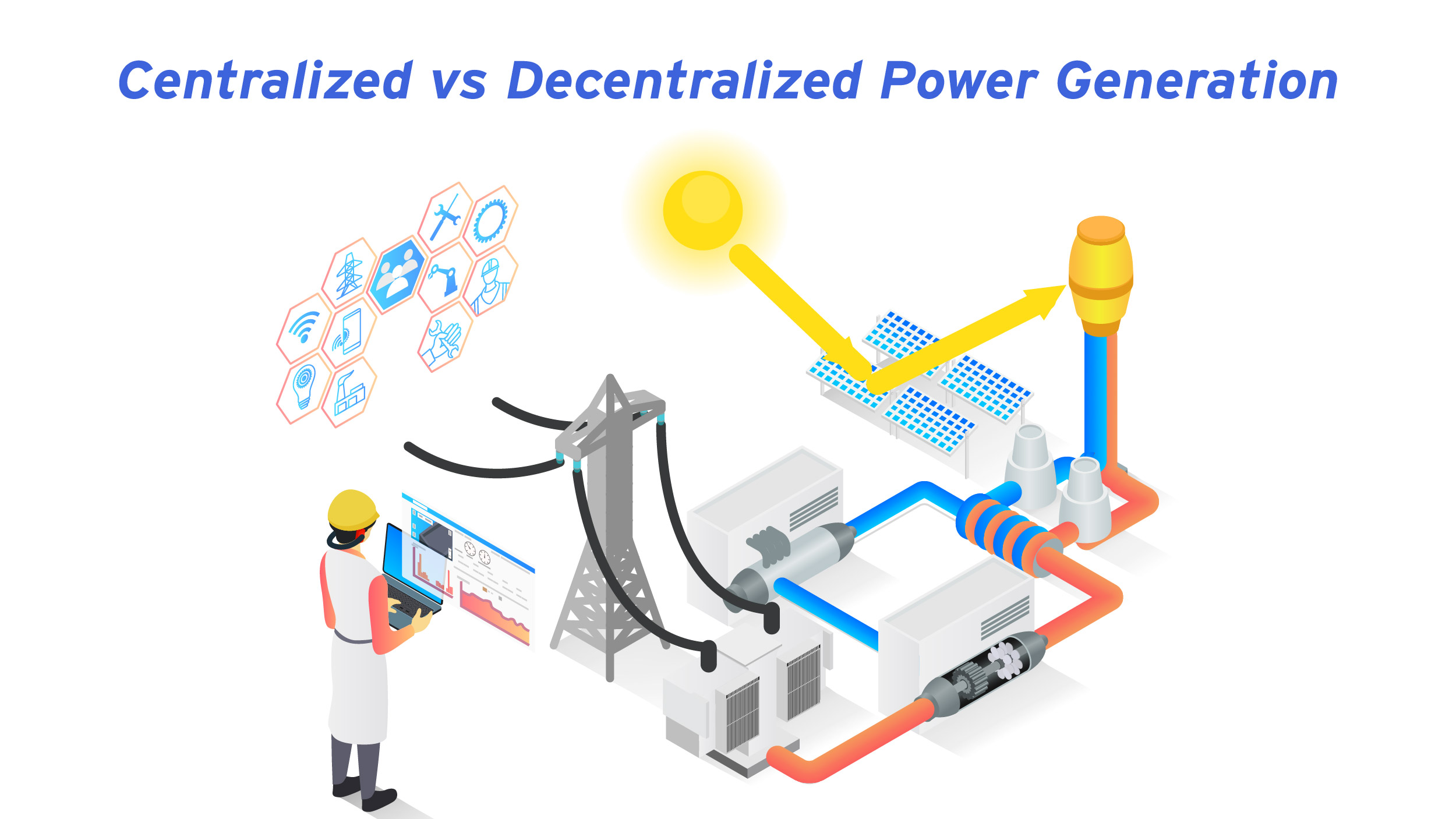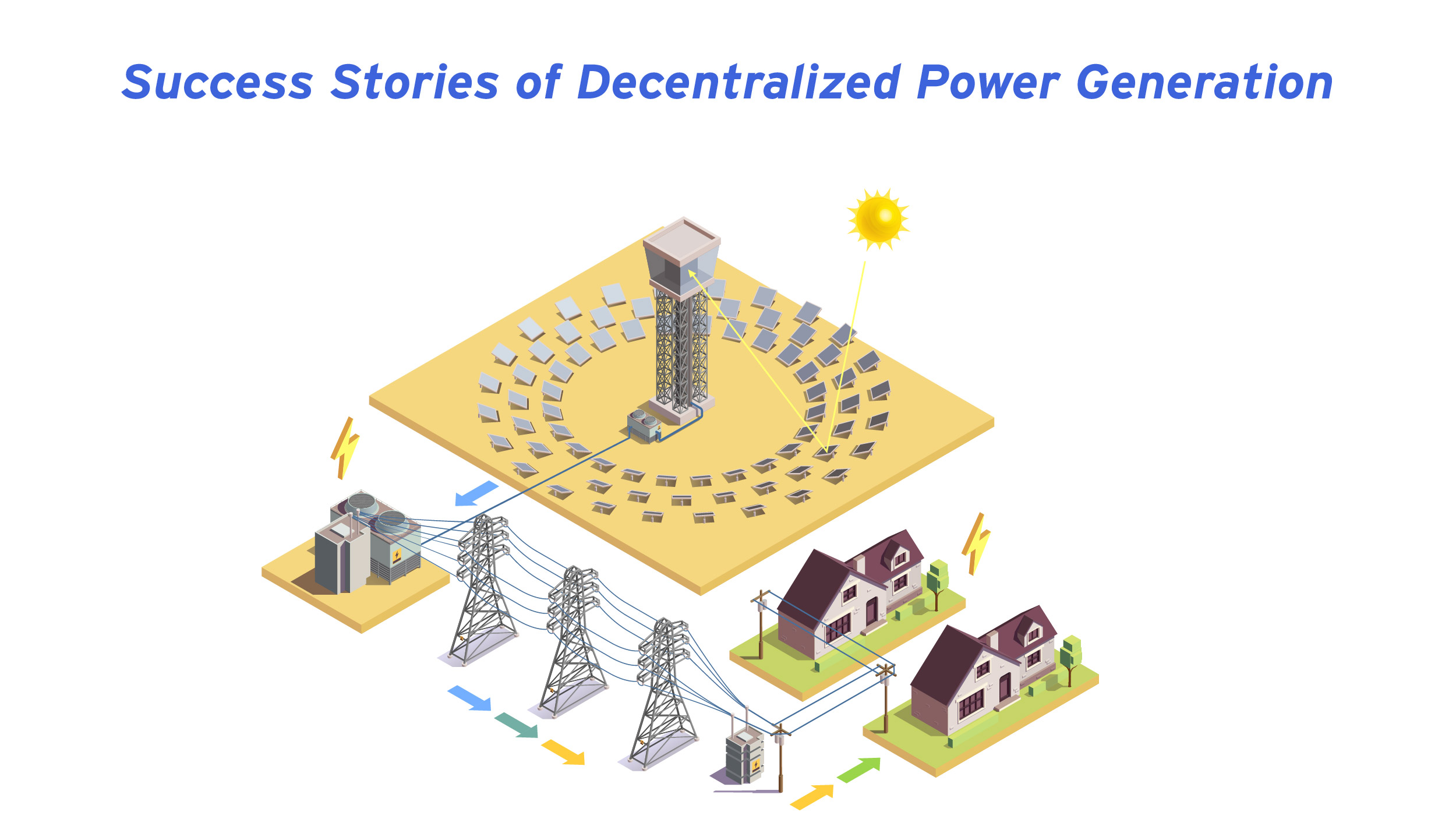Ever wondered about a future where energy isn’t just a commodity but a community-driven powerhouse? Well, that future is here, and it’s buzzing with the concept of decentralized power generation. What if we told you that the way we generate and use electricity is undergoing a quiet revolution, transforming from large-scale power plants to something more local and sustainable? As we move forward in this blog we will explore its perks, and unravel success stories.
Let’s get started!
What Does Decentralized Power Generation Mean?
Decentralized power generation is the production of electricity at or in close proximity to the intended consumption site, in contrast to centralized generation taking place at distant, large-scale facilities. This practice encompasses the utilization of distributed energy resources (DER) and compact, connected-to-the-grid, or connected-to-the-distribution system devices for electricity generation and storage. These resources encompass renewable energy sources like solar panels and wind turbines, as well as combined heat and power (CHP) systems.
Advantages of Decentralized Power Generation
● Increased Energy Efficiency
Decentralizing power generation helps decrease the losses incurred during the transmission and distribution phases in centralized systems. This approach allows power to be generated in close proximity to the end-user, resulting in enhanced energy efficiency and a more economically viable and sustainable energy supply.
● Enhanced Grid Resilience
The decentralized nature of modular systems enhances the resilience of the grid. If a failure or disruption occurs in one section of the network, other segments can operate autonomously, reducing downtime and guaranteeing a more dependable energy provision.
advancements in the electric power distribution system to mitigate carbon emissions and enhance durability have paved the way for the development of more decentralized and renewable power generation systems.
● Environmental Sustainability
Decentralized power generation plays a pivotal role in promoting environmental sustainability by embracing renewable energy sources. This approach not only helps in reducing greenhouse gas emissions but also reduces reliance on non-renewable resources, in keeping with the global endeavors aimed at combating climate change.
Centralized vs Decentralized Power Generation

Centralized power generation and decentralized power generation have notable distinctions in various important aspects, such as:
● Location and Scale
Centralized Generation: Involves large-scale generation of electricity at centralized facilities, such as fossil-fuel-fired power plants, nuclear power plants, and wind farms, usually located away from end-users and connected to a network of high-voltage transmission lines.
Decentralized Generation: Involves the generation of electricity at or near the point of use, using distributed energy resources such as solar panels, wind turbines, and combined heat and power (CHP) systems.
● Environmental Impact
Centralized Generation: It can have a significant environmental impact, especially with fossil-fuel-fired power plants.
Decentralized Generation: It offers a more sustainable and environmentally friendly option, especially when using renewable energy sources.
● Reliability and Resilience
Centralized Generation: It may be more susceptible to disruptions, such as extreme weather events, and can lead to widespread power outages.
Decentralized Generation: It provides greater grid resiliency, less chance of catastrophic outages, and reduced reliance on a single source of power, which makes it more resilient to disruptions.
● Flexibility
Centralized Generation: It has less flexibility to failures. If a relevant fault occurs in a centralized plant, a significant portion of the generated power could be turned off, impacting the dispatching and causing possible power interruptions for several end-users.
Decentralized Generation: It offers higher flexibility to failures compared to centralized generation.
● Market Evolution
The integration of renewable energy resources is pushing the U.S. toward a more decentralized grid, with decentralized markets increasing in popularity as a growing number of renewable energy sources come online.
Success Stories of Decentralized Power Generation

Below are several successful case studies that highlight the advantages and key insights associated with decentralized power integration. This concept is gaining traction as it revolves around the generation and consumption of energy at a local level.
SolarCity’s Microgrid Project in Ta’u, American Samoa
SolarCity, a company that provides renewable energy services, recently carried out a microgrid initiative on Ta’u, an island in American Samoa. The primary objective of this project was to decrease the island’s dependency on diesel fuel for electricity production and enhance its ability to generate energy independently.
Shams Dubai Initiative
The Shams Dubai Initiative is an ambitious solar energy project that is underway in the UAE. Its primary objective is to foster the adoption of distributed power generation by encouraging the installation of rooftop solar panels in both residential and commercial buildings. This initiative empowers individuals and businesses to generate their own renewable energy, thereby contributing to a greener and more sustainable future.
Summing it Up
Decentralized power generation emerges as a transformative solution for our energy landscape. This innovative approach not only addresses the challenges posed by centralization but also opens up new possibilities for sustainability, resilience, and inclusivity. By empowering individuals and communities to harness diverse energy sources locally, we can reduce our reliance on traditional grids, promote cleaner technologies, and create a more robust and adaptive energy infrastructure.
The shift to this method of power generation represents a pivotal step toward a greener and more equitable future, where energy independence becomes a reality for everyone. As the world increasingly recognizes the need for sustainable and resilient energy systems, the decentralized power generation market has gained significant traction. Embracing this decentralized paradigm is not just a choice, it’s a commitment to shaping a more sustainable world for generations to come.






